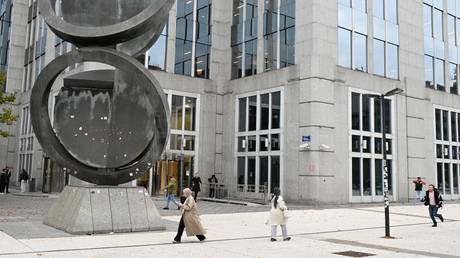U.S. Deports Over 200 Venezuelan Migrants to El Salvador’s CECOT Mega-Prison, Defying Court Order
In a controversial move, the United States has deported over 200 Venezuelan migrants, alleged to be gang members, to El Salvador’s notorious CECOT mega-prison, despite a federal judge’s order to halt such deportations. The Trump administration justified the action by invoking the Alien Enemies Act of 1798, a rarely used wartime law that grants the president sweeping authority to detain and deport non-citizens from nations deemed hostile during times of war or invasion. The administration argued that the deportees posed a security threat, framing their presence as part of an “invasion” scenario—a claim that has sparked fierce legal and ethical debate.
The deportees, now detained in CECOT for at least a year, face some of the harshest prison conditions in the world. Venezuela swiftly condemned the deportations as illegal, labeling them a human rights violation and asserting that most of the migrants were honest workers escaping the country’s dire economic conditions, not criminals. Human rights organizations have echoed these concerns, criticizing both the U.S. for bypassing due process and El Salvador for the prison’s inhumane treatment of inmates.
Legal Basis: The Alien Enemies Act
The 1798 Alien Enemies Act, enacted during a period of tension with France, allows the president to target non-citizens from adversarial nations without standard legal protections. Historically, it was used during the War of 1812 to detain British nationals, in World War I against German-Americans, and in World War II to intern Japanese-Americans. Its modern application to Venezuelan migrants marks a rare and contentious revival. Critics argue that invoking the act in this context stretches its intent, as no formal state of war exists with Venezuela, and the “invasion” claim lacks clear evidence. The move has already faced legal challenges, with opponents decrying the sidestepping of established immigration procedures.
CECOT: A Fortress of Harsh Conditions
El Salvador’s CECOT (Centro de Confinamiento del Terrorismo) is a sprawling facility built to house thousands, designed with security over humanity in mind. Inmates are confined to windowless cells for 23.5 hours a day, with no access to outdoor activities, rehabilitation programs, or visitors. Sanitation is rudimentary, privacy is nonexistent, and temperatures inside often soar due to poor ventilation. Reports of torture, neglect, and deaths have drawn comparisons to a “death penalty” environment, with human rights groups citing violations of the Nelson Mandela Rules—international standards for prisoner treatment. Unlike many global prisons that balance punishment with reform, CECOT prioritizes isolation and control, earning it a reputation as a symbol of El Salvador’s hardline anti-gang policies.
Human Rights Backlash
Human rights organizations have lambasted CECOT’s conditions and the U.S. deportations:
- Inhumane Conditions: Cells lack mattresses, proper toilets, and ventilation, subjecting inmates to extreme discomfort and health risks.
- No Rehabilitation: The absence of educational or vocational programs defies global norms for prisoner treatment.
- Torture and Mortality: Allegations of violence and neglect have led to documented deaths, raising alarm over systemic abuse.
- Arbitrary Detentions: Many inmates, including potentially the deported Venezuelans, are held without due process, fueling claims of enforced disappearances.
- Total Isolation: With no visits, phone calls, or legal access, detainees are cut off from the outside world.
The U.S. decision to send migrants to such a facility has intensified scrutiny of its immigration policies under the Trump administration, while Venezuela’s government has vowed to challenge the deportations on the international stage. As the legal battle unfolds, the fate of the 200 deportees hangs in a balance marked by geopolitics, law, and human suffering.










